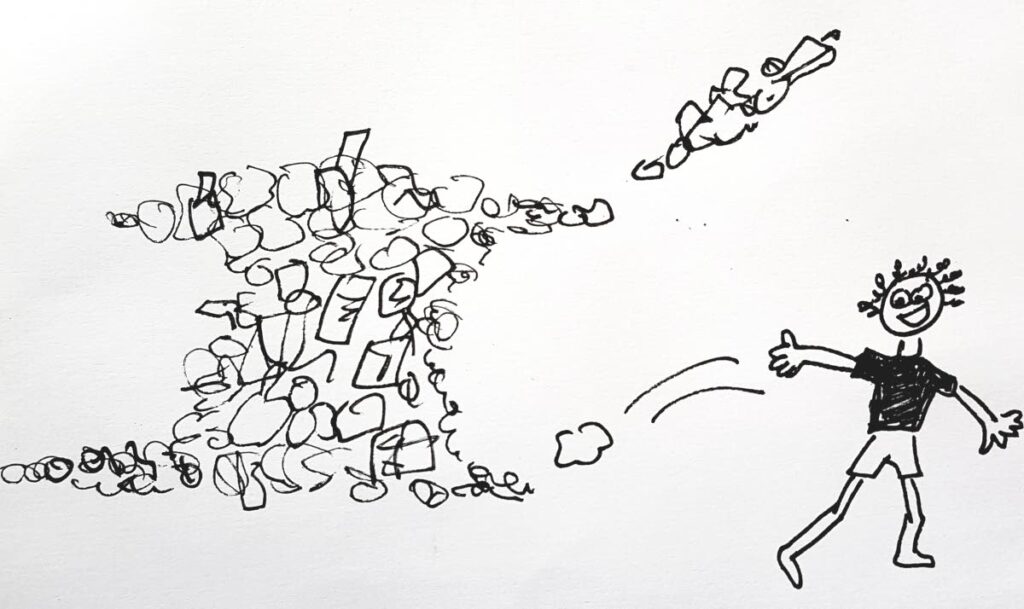Let's clean up our act

As a child attending primary school in Tobago, Andrew (not his real name) would be teased by his friends for always placing the wrappers from his snacks in his pocket, if there was no garbage bin around. Because his parents had taught him from a very young age to be responsible for the general environment around him, he was unlike the rest of his schoolmates, who routinely threw their wrappers on the ground.
One day, while out in the playground, one of Andrew’s classmates grabbed the wrapper from his pocket and threw it on the ground. As a small scuffle began, with Andrew attempting to retrieve the garbage, his classmate teasingly informed him that his mother had told him that Andrew was depriving a cleaner of her job by not throwing his litter on the ground.
In the days when beaches were open, Lucy (not her real name) would walk daily along the shoreline of one of her favourite Tobago beaches, collecting bottles, ceasing only when her large garbage bag was full. One day a fisherman confronted her, stating that there are people who are paid to clean the beach...so why would she do it for free and, at the same time, take away someone’s livelihood?
Pre-covid, Jenny (not her real name), a foreigner, would visit Tobago annually to spend time with local friends. Once, while traveling in a car with some of them, one of the men casually tossed a bottle out of the window. Incensed, Jenny reprimanded him: “You live on such a beautiful island! Why would you mess it up by littering like that?”
The litterbug laughed it off, stating that had he not done it, the person who is paid to pick up garbage would be out of a job.
A recent video featured on social media shows a few men pulling what looks like large basins and buckets off of a truck tray and throwing them down a hillside in Les Coteaux. As she advances towards them, a woman who is videotaping the act shouts at the men in disbelief, asking why they would do that, especially when they could just as easily take the rubbish to the dump.
In spite of the fact that she is shouting and calling their names (apparently familiar with them) while capturing their actions and vehicular number plate on camera, the men totally ignore her and continue to litter the hillside.
I cannot help but wonder: (i) Did these men think that they would have deprived someone of a "wuk" by taking the items to the dump instead?
(ii) Did the woman subsequently report the matter, with video evidence, to the police? If yes, were charges laid?

The first three examples presented in this article were recently told to me by people I know, all in one afternoon. I happened to see the video (example No 4) later that evening. I was saddened by the realisation that the mindset which enables such behaviour is not isolated, but (apparently) prevalent, most likely passed down from one generation to the next and, therefore, quite challenging to shift.
Many citizens expect leaders, or whichever party is in power, to "fix" society and draft laws for people to do the right thing. However, leaders alone are not responsible for "fixing" our behaviour or guaranteeing the widespread positive change we crave...just as those who are paid to pick up garbage are not the only ones we should expect to keep the island clean.
With no disrespect to other political parties, the PDP’s current campaign slogan – Leh We Fix Dis – comes to mind as a fitting example for the point I am making. A slight adjustment to "Leh Me Fix Dis" illustrates further that before there can be a strong "we," there must be a strong "me."
Every "me" in Tobago (and Trinidad), regardless of political preference, must take personal responsibility for doing the right thing...and not waiting for anyone else to do it. It is no one else’s job...in fact, it is not a "job" at all to care enough to better the space in which we live. Every "me" who commits to the improvement and upkeep of his/her immediate environment (inner and outer), contributes to the powerful collective "we" that will enable widespread, ongoing positive transformation. Until this happens, there will be no real cleaning up of the "mess" in which our society finds itself.


Comments
"Let’s clean up our act"